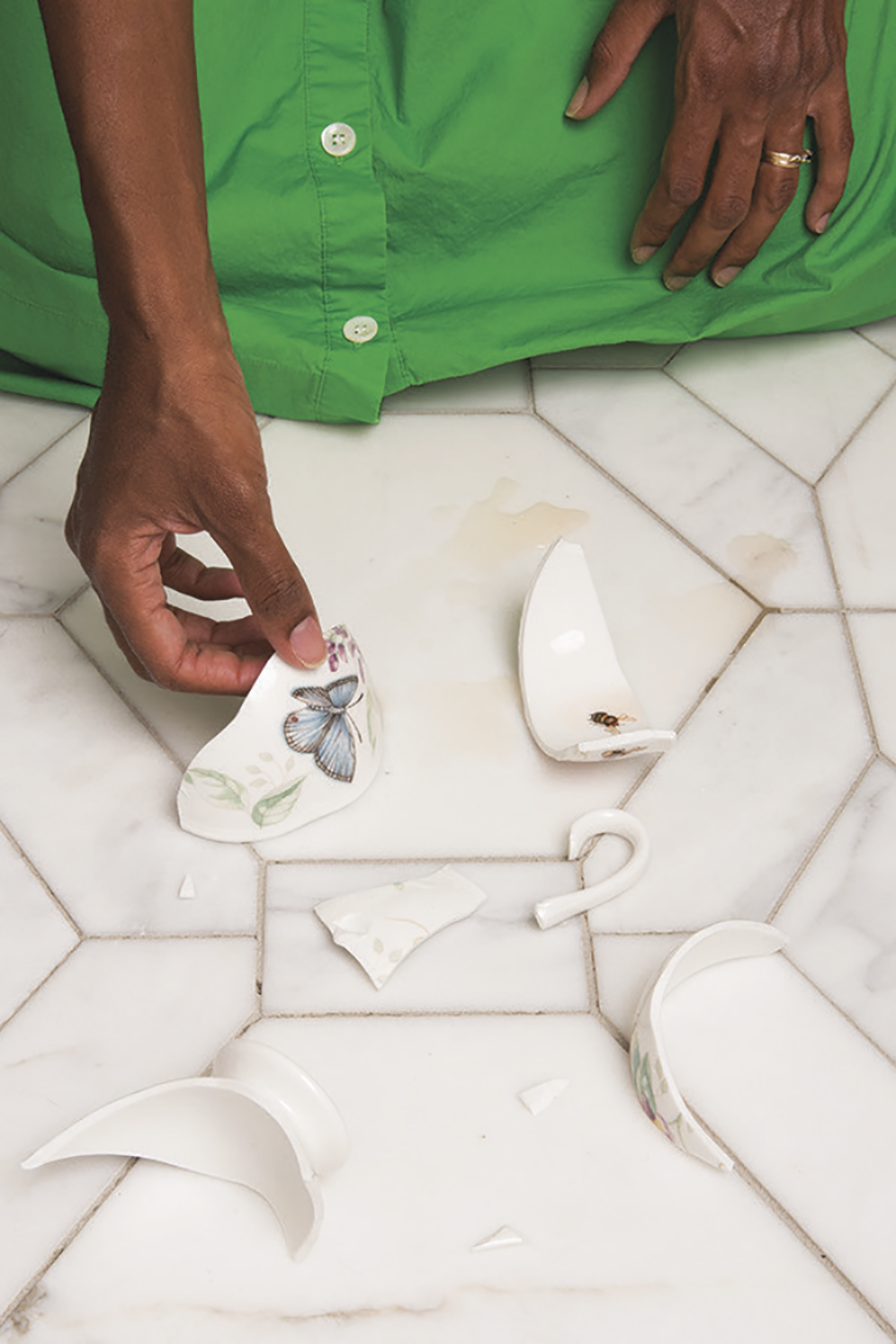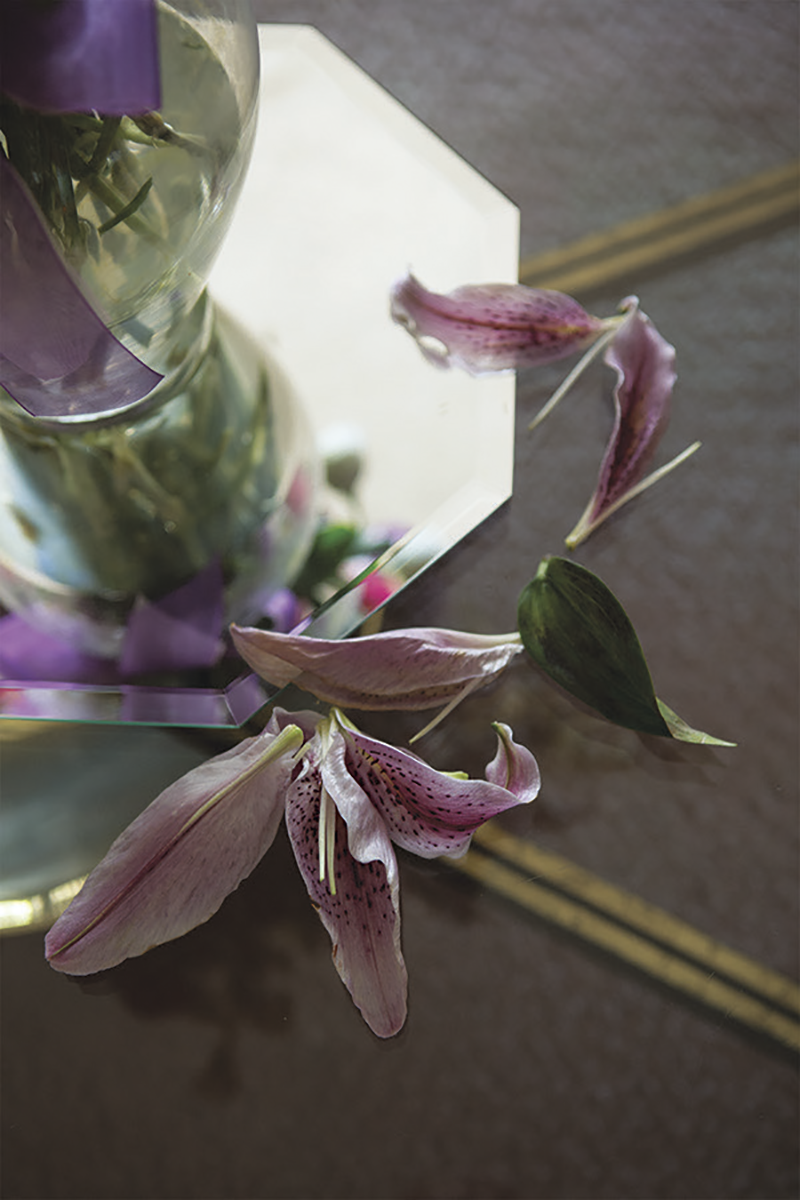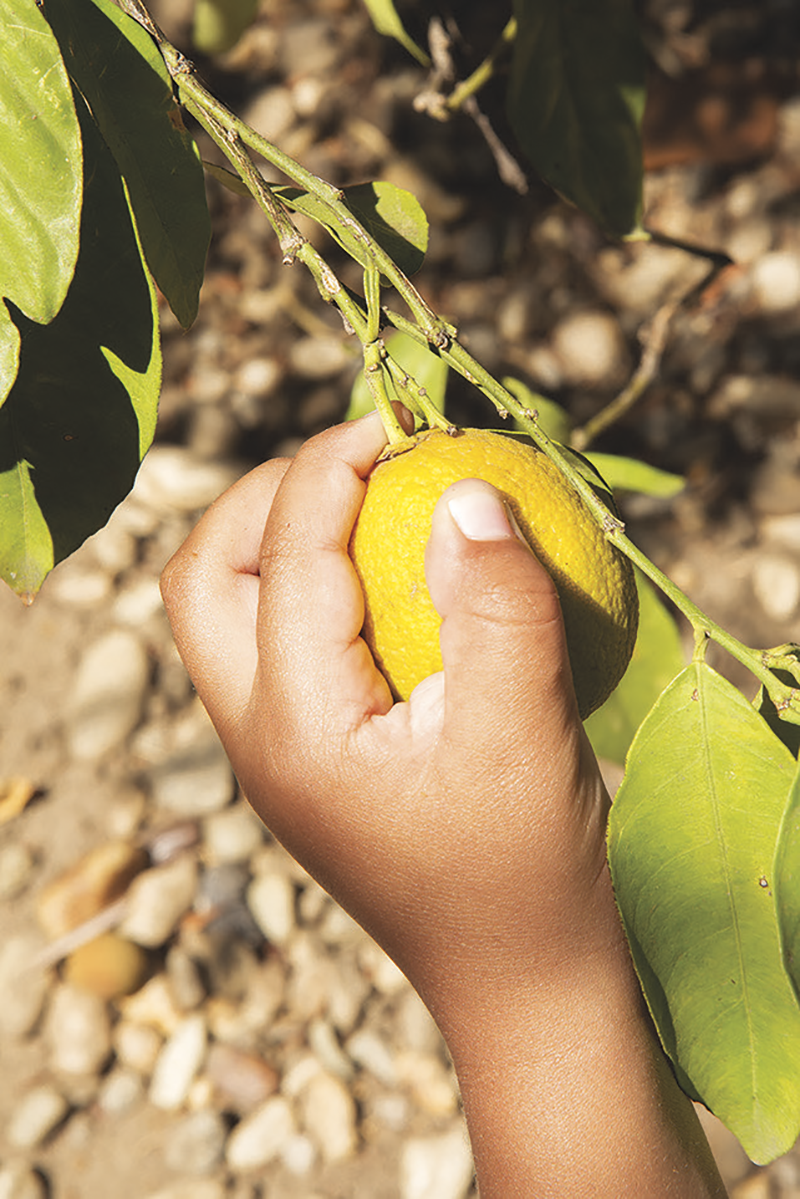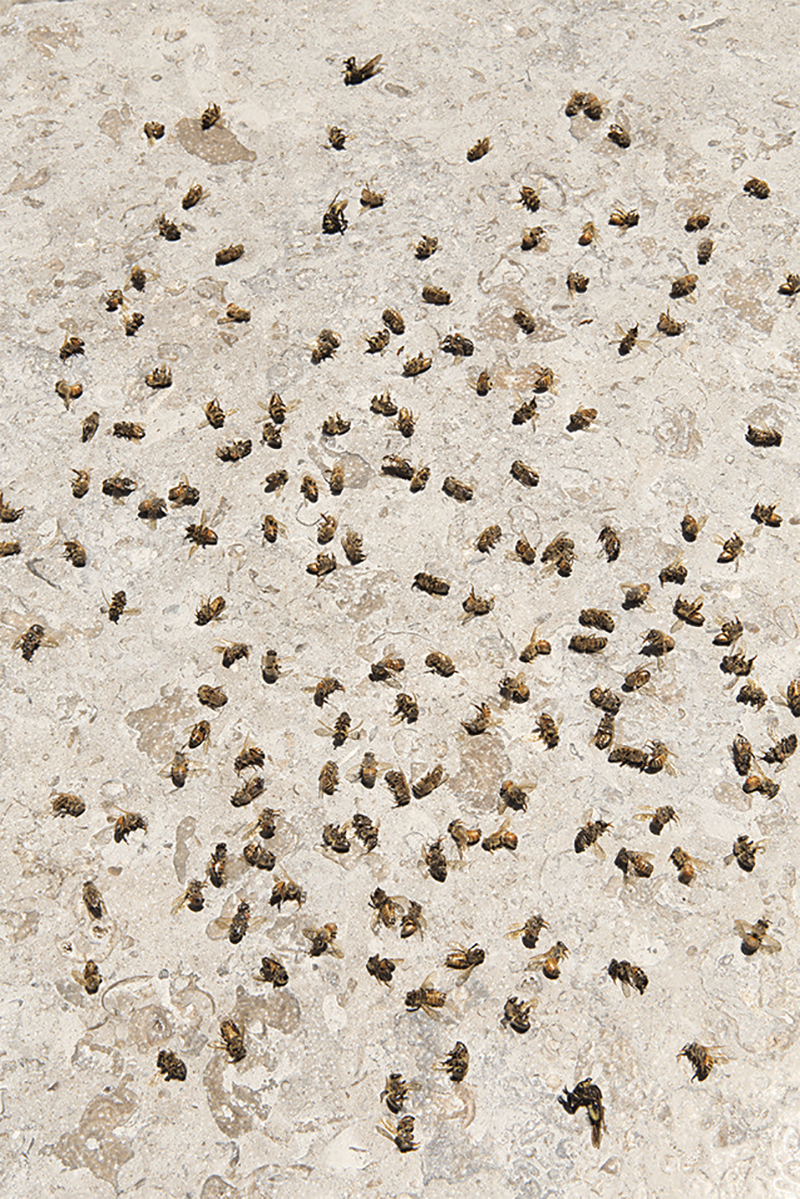
Photographs by Janna Ireland © The artist
1.
I collect living things at the end of their lives. Faint, failed. Gift of a rose half-bloomed before having enough. Dried lilac pressed between high-shelved Lispector volume and Alejandra Pizarnik’s Extracting the Stone of Madness. Late-summer pine cone brushing the spine of Lucille Clifton’s Collected. Snapped from the vine to save the others—a yellowed philodendron leaf. Was it the lavender incense I burned the nights I couldn’t sleep? Did I make a mistake leaving it in water so long? It thrived all year until now. I brought it home from my office when campus closed. Watched the roots deepen their tangle as they lengthened. Maybe I just need to find the right soil for rescue. Rescue, the action, as opposed to miracle, a noun received, which shifts responsibility to some mysterious else. I want to behave responsibly in preserving any life, or honoring its end. Hands moving not in sleight, but service.
◆
I place the second philodendron leaf to lose all of its dark onto the writing desk in my bedroom. The yellow—an almost-sick yellow-green, makes me want to paint. I keep saying that, to myself, out loud, on Instagram, trying to make it real. Brushes and watercolors—ochre, alizarin, quinacridone gold, viridian, carmine, lampblack, Payne’s gray, Prussian blue tucked in a fabric box. Unused, have they lost their power? What are we made to do? News of empty meat shelves and workers denied protection and whiny Orange County surfers threatening a measured recovery, the health of beloveds. And aren’t strangers, too, beloveds. Do we not call each other brother, sister, in certain gatherings?
The virus doesn’t choose who is a stranger; we do. Moon through curtain crack: a thin, ambient light.
2.
Artichokes, asparagus, aspens, autumn. I list what I appreciate. Stray notes to triangulate out of haze. On the first day of quarantine, my mother stood next to the patio doors without opening them. Our apartment building, in suburban Colorado, is shaped almost like a honeycomb, with a courtyard in the center. We overlook a fountain, brilliant sky. She said: The sun got nerve enough to shine.
She’ll be eighty-two this year. Rare, now—a hug, smoothing hair in passing, clasping hands.
3.
The times I made banana bread before the pandemic, I forgot to separate wet and dry ingredients before mixing. I’d read the directions once and think I remembered correctly. This time, I read them again because it has been a while, and realize that, as usual, moving too fast leads to mistakes. To slow down: a daily decision, moment by moment. What else could I have saved from ruin? I exaggerate. What else could I have done correctly. I think of joy as well as loss—missed taste, lighter texture. I think about the poems I wrote out of rage and despair, bound in a book with a beautiful cover, wonder if I crafted them to fall apart.
 4.
4.
In New York, my younger sister has a fever.
She doesn’t often get sick, and she is so tired she cannot get up without vertigo spinning her back down. On FaceTime, her children climb all over her, pull her arms, snuggle into her neck, touch the outside of her mask. She is too weak and out of breath to stop them. She coughs. I beg her to get the test. I beg her to rest. I beg my brother-in-law to stop working and help her with the kids. He won’t. My sister gave up a career in real estate so he could build his. My mother wants to bring the kids here, but she and my sister aren’t even speaking. I yell at my mother to fix it, beg her to apologize. She won’t.
I bought a hooded Tyvek suit in early March, after Naomi Campbell posted a video wearing one. It takes all my strength not to pack it up and drive across six states to the epicenter.
5.
Lemon balm tea, raw honey, vegan toast, blackberries.
White bean soup with carrots, parsley, white pepper and black pepper.
End of week, May 3, 2020: 843 deaths in Colorado. In my county, +20.4 percent from last week.
Legionnaires’ disease can travel through air-conditioning vents, my son discovers. He is a gamer, and likes to keep track of rules and facts. The largest outbreak of Legionnaires’ in New York City’s history, in the South Bronx in 2015, was spread by cooling towers. The warmer it gets, the less use these ceiling fans will be.
Masked up, glasses on, hair covered by hood or the black Goorin Brothers hat I bought in California with my friend Ariel—I drive to Firestone, Frederick, Longmont, Erie; bring paper booties, gloves, sanitizer, wipes. In the middle of this chaos, I am trying to buy a house.
6.
March and April event cancellations come fraught, swift. I cancel my trip to San Antonio, to appear on scholarly panels and meet up with poet friends I only see once a year. I cancel a vacation in Charleston with my sister, her first since the kids were born. I postpone a weekend getaway to Santa Fe with new friends—not writers, business owners—fellow fans of spas and French food. Took my whole life to allow such pleasures. Rescheduling? Indefinite. Then May, June, July events—poof. Thousands in summer honoraria blink into 2021 or full disappearance. I return clothes I bought for performances while I still can. The line at Nordstrom Rack stretches so far they rope us off in an L shape from the front of the store all the way to the back. Fourth of March. I am the only one wearing gloves and a mask. The cashier has a pump bottle of sanitizer next to the register, but he doesn’t use it.
7.
My people are dying at exponential rates. My people are dying. My people. I think about access, influence, screening, separation. The Rona is a monster. Another invisible force that wants to use us up until we die.
A history I spent a lifetime learning flashes through me every time I hear that, as usual, our rate of death is out of proportion with our numbers in the population. I think about the commoditized spectacle of Black suffering that Dr. Saidiya Hartman describes in Scenes of Subjection: Terror, Slavery, and Self-Making in Nineteenth-Century America, and I refuse to contribute. I think about the irony of Debord’s The Society of the Spectacle. I think about the Barthes essay “The World of Wrestling” and how much I used to love the old WWF, the days of Junkyard Dog and Hulk Hogan and Rowdy Roddy Piper. I think about Piper’s 1988 film They Live, a sci-fi fable about class conflict. I want people to do their own work of understanding, because otherwise they won’t understand, ever, and nothing we say or make or do or survive or don’t will change it. Absurdly, Jennifer Aniston’s line in the movie The Break-Up pops into my head: “I want you to want to do the dishes.”
I cannot write about the police and vigilantes killing us, headlines repeating carceral absurdities that say it’s our fault for running, eating, driving, talking, sleeping, existing.
Very tiresome things: victim-blaming; absence of reparations; the constant surprise.
◆
A story blinks nonstop in my Twitter feed in May: a man in Flint, a security guard at a Family Dollar, killed in anger. The rage source: the killer’s sister being told to wear a mask. His nickname was Duper, short for Super Duper. His eight children, his mother, his wife and family and friends shattered into mourning, embracing in masks, weeping. There’s a sea of Mylar balloons and lit candles. Every loss: incalculable.
 8.
8.
Asthma and other chronic health issues keep both my son and my mother at risk; my mother takes so much medication we have an Excel spreadsheet to keep track. They’ve sheltered in place for eight weeks. I’m at risk, too, but I try not to think about it. I have to be the one going out. I have to be the one who works, even if I work at home. I record lectures for my students, answer their emails, respond to their poems and essays and questions, try to remain a stable and generous presence for them as the world shuts down.
◆
One of my nieces calls to ask about our heritage—names, places, and dates of birth and death. My mother tells me a story. Fighting snow, looking for a job in Detroit, my grandmother’s mother contracted the flu, then pneumonia. A hundred years ago, she died.
9.
March 31: the peak day for deaths in France. 7,578 souls counted. I vault into memories of our summer last year in Paris, Lyon, Arles, Rouen. My son and I have become those people who talk about France all the time, missing the luxe contrast of traveling during an unprecedented heat wave, the ease of our existence there—no suspicion during our exploratory walks and Kapten rides, no feeling of being unwelcome in shops, and plenty of unexpected kindness.
We planned to go back in winter, spill into crisp Côte d’Azur light again. I wanted to visit Baldwin’s home in Saint-Paul-de-Vence and go inside, not just touch the wooden door. But we don’t know any when or where anymore. My anxiety infuses tweets, texts, calls, trips to the store for more food and supplies. I can’t worry about how I look to my colleagues—that would make it worse. More panic attacks in a month than I’ve had over the past four years. I worry about people being tired of me, but worry more about the risk of disconnection. Early in lockdown, back to back, three writers lost to suicide.
One text thread with friends is called Holy fuck.
10.
Afternoon palimpsest of thought—feels foolish to think about what I make, when I can’t help my baby sister. A text from Emily, whose husband works in a hospital, confirms my sister’s doing everything right: sleeps on her side, eats healthy, takes vitamin C. One new thing she shares: move as much as you can. On CNN, virus-caught anchor Chris Cuomo said from his basement: The virus wants us to lie down. He said, The beast comes at night. Before the pandemic, his corny catchphrases made me roll my eyes. I didn’t watch his show. All of April, his segments riveted—human stories that left me weeping. I couldn’t write a word.
Pieces of my dissertation got published in futurefeed, but it felt strange to share them. A piece of my Navy memoir, from my time as a sailor in the 1990s. Travel diary excerpts—outraged observations of empire in Europe, balanced with rhapsodic musings about the food. And an academic essay.
When I wrote that essay, about the value of studying Muriel Rukeyser even though, like Whitman and Melville—writers she identifies as American literature’s light and dark forces, respectively—she operated from a baseline assumption of white supremacy, I meant to provide practical guidelines for analyzing older American literature, for understanding it with greater accuracy, for tracing its cultural influence and mining its prescience. I meant to offer an alternative solution to throwing it all away. I meant to create a means of redefining the canon. Even the intention behind the effort feels like failure. We already live the truth of what and who gets tossed aside.
◆
1:10 pm, 5/3/2020—a time of reckoning. And 68,040 Americans dead. Around the world: 228,504 people. I hate when reports round up or down. Count every one. Keep counting.
11.
Raise the blinds to let in sun. Group texts and Zoom meetings and emails, the endless electronic scroll zapping my fingers and wrists into a soft curve, tense knuckle peaks, pushing my shoulders tight. My mother writes a note in cursive, for me to pass along to my sister:
Another option:
the children can
come here, and
Irshaad’s the weekend
Just a thought
Irshaad is my brother-in-law’s brother, and he moved here to Colorado last fall. My sister wanted to come, too, after they visited last summer and loved it, but her husband’s businesses are on the East Coast. He refused.
◆
Used to be I could rest through fibromyalgia flares, recover. Now I depend on balms and pills to keep going through the pain. Dr. Bob’s, vapor rub, Papa Rozier balm, Aleve PM, Benadryl, charcoal bath salts, lavender oil. Make a pleasure of coffee or espresso for the fatigue. Bless Nespresso machines. Elvazio, Melozio, Hazelino, Voltesso. Solelio for something lighter, if I have to wake up but know I’ll need sleep later.
LOL sleep. For the first two weeks of lockdown, I dream about nothing but death. Six nights of scorpions, six of snakes, two of sheer bloody violence—both mass and intimate. Then I wake to press conferences as propaganda, terrifyingly absurd.
All my limbs stiffen overnight. How I wake: slow, scrolling.
 12.
12.
Putting on a face is not difficult, because I know who I am.
Let me clarify. I know who I am, but I know how to mask up, too.
I’m in meeting after meeting trying not to count faces in squares, track who disappears, each avatar switch, institutional tics. Evening light dominates the room. I like to keep the windows open, but my son fears the virus could travel in on a cough or sneeze. I’ve avoided my spring-dusted patio for days, and my sister has tested negative. She tested negative, but she’s still sick. Negative for flu A, negative for flu B, negative for COVID. The coronavirus is a lethal fog of unknowns. Act like you have it, advised the doctor. Twenty percent error rate. False negative. Mild case. Or is it something else, not the virus—Google says her symptoms match Ménière’s, but I worry about slippery self-diagnoses and informed assumptions. And even if she does feel better soon, if it is the virus, what if it comes back?
For mood lifts, I watch the video my sister sent of the kids singing Kendrick Lamar’s “Alright.” She’s teaching them to say gon’. In their sweet and tiny voices, they keep saying We’re going. We’re going to be alright. I smile. My sister has them repeat after her: moan, bone, gon’. They laugh. We’re gonna be alright. Her husband is from Suriname. He says We’re gonna whaaat? They can’t say it until the end. I laugh every time. I sing it, too.
A few weeks later, I text a haiku that makes my sister press the haha reaction:
In my sister’s yard,
Great horned owls perch in who-song
Soon, murder hornets
◆
We share the living room by sitting in separate places, at least six feet apart—my mother, my son, and me. Today I notice we are lined up, as if next to each other. One, two, three.
13.
My extended family in Michigan: lab techs, nurses, cleaners. My niece is an LPN at a senior care home where two patients have died of COVID-19. No hazard pay, no PPE. She takes care of her mom—my oldest sister, who had a heart attack last summer, the sister who listens to me read my poems in early drafts, the one who said, when I explained the zuihitsu form: It sounds like a theater of the mind. I beg her not to go out; she says she’s protected—mask, gloves, hat, glasses. But no one else at the laundromat or grocery store does the same. They cough, and don’t care who inhales it.
◆
April 30: Men in masks line up on the steps of the Michigan capitol, armed with assault weapons and whiteness, scream about their freedom and call it a protest.
I could preach myself out of breath.
I think about Brecht and Beckett. I think about Fanon and Baudrillard. I think about bell hooks: “There can be no love without justice.”
14.
Between cooking and checking on her cousin Nita in Detroit, my mother remembers and corrects memory, talking through Alzheimer’s and time collapse. I remember the Depression. We had these little red tokens, had to stand in a line to get food. Papa didn’t even try to work. He just gave up. Papa was her grandfather, not her father, who shoveled coal in Ford’s furnace rooms.
Since 2016, I’ve been writing fables based on my family’s history in America, the South and the North, the many violences underneath the various ways of giving up; the riddles my grandfather was known for, how he could play the piano by ear, any song; how his mother escaped a sharecropper’s life in Georgia, boarding a train to Detroit with her seven sons, running numbers and taking in laundry in Black Bottom to feed them; the silences of mothers and aunts broken only by my persistent digging. The reimagining is slow because of the pain. I want it honored, but I don’t want to make it a parade.
◆
My mother interrupts me with stories while I write and grade papers. She talks so much I have to hole up in my room if I want quiet. On days I listen, I never know if it’ll be a story I’ve heard a million times or something entirely new to me. I love hearing the ones about the garden she had as a child. She tells me what she planted with her father’s mother, Rosa, behind the little brick house her father built with his six brothers. Mom stands in the doorway in the one-size-fits-all linen dress I bought for her in Florence, sun on her white hair, and lists a bounty—corn, tomatoes, cucumbers, carrots, cabbage, mustards and turnips and collard greens, okra, string beans and hot peppers. I ask about the animals. She likes to tell the story of why her sister Evelyn hates chicken: Gramma would catch a chicken by the neck and pop! Lay that chicken on a stump and chop that head right off. Poor thing kept running till it fell in the dirt. Then we had to boil it and pluck the feathers. Evelyn hated the blood, hated that boiled chicken smell. My mom chuckles. Didn’t bother me none. Evelyn became a nurse.
I think of all the families now without parents, siblings, aunts, uncles, grandparents, children, cousins: the devastation will carry over generations. I think of them dying alone, mediated by electronics, and left on a reefer truck until . . . when? What is the signal for unending grief?
A friend who lives near Elmhurst Hospital describes the ambulance wails as nonstop. Central Park on the first Sunday in May: a Seurat painting, virus-pixelated air, whitely surreal, a false dawn.
15.
What do we face now? What if we fail to protect each other? Miscellaneous questions bombard me. I did so much work to ease my rage, then to rectify a traumatized passivity; what if either comes back? Did I ever believe I was free? Did I ever believe I could pretend not to be?
My uselessness outside the cocoons of home and work feels endless. Then I return to The Source of Self-Regard—the only Toni Morrison work I have yet to finish. One chapter and I’m unfooled again.
Deceptive things: healing, archives, talk of inclusion, literary theories, second-dinner hunger, the interruptions of children, trending Twitter topics, the virus.
◆
One Thursday the robins flooded my morning. American, orange-breasted on bare branches, aiming for the light behind thin clouds.
I find out philodendrons need indirect sun. I move this living thing closer to shadow.



